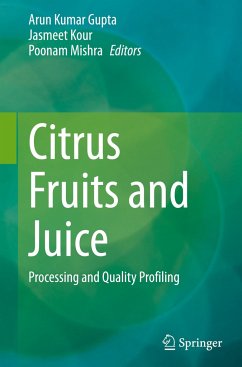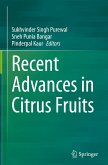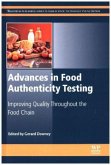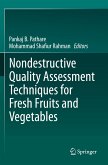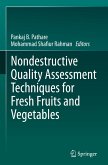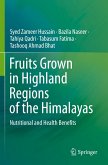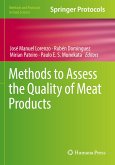Citrus Fruits and Juice
Processing and Quality Profiling
Herausgegeben:Gupta, Arun Kumar; Kour, Jasmeet; Mishra, Poonam
Citrus Fruits and Juice
Processing and Quality Profiling
Herausgegeben:Gupta, Arun Kumar; Kour, Jasmeet; Mishra, Poonam
- Gebundenes Buch
- Merkliste
- Auf die Merkliste
- Bewerten Bewerten
- Teilen
- Produkt teilen
- Produkterinnerung
- Produkterinnerung
This book provides a comprehensive overview of current scientific research on citrus juice and by-product technologies. It covers various aspects of citrus and its processing, encompassing biochemistry, advanced juice processing technology, and health considerations. The book also delves into testing methodologies for various chemicals, phytochemicals, and bitter compounds. Furthermore, it presents innovative and efficient methods for the detection, quantification, and removal of bitter chemicals to enhance the commercial appeal of bitter cultivars. A special emphasis is placed on non-thermal…mehr
Andere Kunden interessierten sich auch für
![Recent Advances in Citrus Fruits Recent Advances in Citrus Fruits]() Recent Advances in Citrus Fruits154,99 €
Recent Advances in Citrus Fruits154,99 €![Recent Advances in Citrus Fruits Recent Advances in Citrus Fruits]() Recent Advances in Citrus Fruits154,99 €
Recent Advances in Citrus Fruits154,99 €![Advances in Food Authenticity Testing Advances in Food Authenticity Testing]() Advances in Food Authenticity Testing197,99 €
Advances in Food Authenticity Testing197,99 €![Nondestructive Quality Assessment Techniques for Fresh Fruits and Vegetables Nondestructive Quality Assessment Techniques for Fresh Fruits and Vegetables]() Nondestructive Quality Assessment Techniques for Fresh Fruits and Vegetables145,99 €
Nondestructive Quality Assessment Techniques for Fresh Fruits and Vegetables145,99 €![Nondestructive Quality Assessment Techniques for Fresh Fruits and Vegetables Nondestructive Quality Assessment Techniques for Fresh Fruits and Vegetables]() Nondestructive Quality Assessment Techniques for Fresh Fruits and Vegetables139,99 €
Nondestructive Quality Assessment Techniques for Fresh Fruits and Vegetables139,99 €![Fruits Grown in Highland Regions of the Himalayas Fruits Grown in Highland Regions of the Himalayas]() Syed Zameer HussainFruits Grown in Highland Regions of the Himalayas108,99 €
Syed Zameer HussainFruits Grown in Highland Regions of the Himalayas108,99 €![Methods to Assess the Quality of Meat Products Methods to Assess the Quality of Meat Products]() Methods to Assess the Quality of Meat Products93,99 €
Methods to Assess the Quality of Meat Products93,99 €-
-
-
This book provides a comprehensive overview of current scientific research on citrus juice and by-product technologies. It covers various aspects of citrus and its processing, encompassing biochemistry, advanced juice processing technology, and health considerations. The book also delves into testing methodologies for various chemicals, phytochemicals, and bitter compounds. Furthermore, it presents innovative and efficient methods for the detection, quantification, and removal of bitter chemicals to enhance the commercial appeal of bitter cultivars. A special emphasis is placed on non-thermal processing, exploring the multifaceted aspects of citrus juice processing, including by-products. In addition, the book addresses the safety aspects of processed juice and related products, a topic often overlooked in other works. It particularly highlights the packaging requirements for juice and related goods.
This book is tailored for researchers, students, and professionals in the food processing industry.
This book is tailored for researchers, students, and professionals in the food processing industry.
Produktdetails
- Produktdetails
- Verlag: Springer / Springer Nature Singapore / Springer, Berlin
- Artikelnr. des Verlages: 978-981-99-8698-9
- 2024
- Seitenzahl: 456
- Erscheinungstermin: 19. März 2024
- Englisch
- Abmessung: 241mm x 160mm x 30mm
- Gewicht: 789g
- ISBN-13: 9789819986989
- ISBN-10: 9819986982
- Artikelnr.: 69237649
- Herstellerkennzeichnung Die Herstellerinformationen sind derzeit nicht verfügbar.
- Verlag: Springer / Springer Nature Singapore / Springer, Berlin
- Artikelnr. des Verlages: 978-981-99-8698-9
- 2024
- Seitenzahl: 456
- Erscheinungstermin: 19. März 2024
- Englisch
- Abmessung: 241mm x 160mm x 30mm
- Gewicht: 789g
- ISBN-13: 9789819986989
- ISBN-10: 9819986982
- Artikelnr.: 69237649
- Herstellerkennzeichnung Die Herstellerinformationen sind derzeit nicht verfügbar.
Dr. Arun Kumar Gupta was conferred with a doctoral degree from Tezpur University, Assam, India, in the Department of Food Engineering and Technology. He currently holds the position of Assistant Professor in the Department of Food Science & Technology at Graphic Era (Deemed to be University), Dehradun, India. He is a lifetime member of the Association of Food Scientists and Technologists (India), the International Society of Food Engineering, and the Institute of Scholars. Furthermore, he has been honored with the prestigious SRISTI-GYTI Award 2021 by the Government of India. In addition, he received a CSIR-Travel grant to present his research at the 35th EFFoST in Switzerland. His project was selected as one of the top 200 (out of 1,200) in the Agriculture and Food Processing category for the 2021 Indian International Science Festival. Dr. Gupta received the National Summer Research Fellowship, jointly offered by INSA, IASC, and NASI. His research encompasses post-harvest technologies, fruit processing, starch modification, and sensor fabrication, with his work being published in prestigious journals with high impact factors by eminent publishing houses in the field of food science. Dr. Gupta has also presented his research at numerous national and international conferences, where he has received accolades such as the Best Poster Award, the Best Oral Award, and the Young Investigator Award at several national conferences. Additionally, he is currently editing two books (Elsevier and CRC Press) and has authored or co-authored several book chapters and scientific articles published in international books by prestigious publishing houses. Dr. Gupta is the recipient of the NF-OBC fellowship for his Ph.D. and a Research & Innovation grant from Tezpur University to support his project. Moreover, Dr. Gupta serves as a potential reviewer for prestigious journals, including the Journal of Essential Oil-Bearing Plants, Current Nutrition and Food Science, Discover Foods, Vegetos, Food Science & Nutrition, BMC Complementary Medicine and Therapies, and others. Dr. Jasmeet Kour received her doctoral degree from Sant Longowal Institute of Engineering and Technology, Longowal, Sangrur, Punjab, in the Department of Food Engineering and Technology. She has been serving as an Assistant Professor in the Department of Food Science and Technology at Government College for Women, Gandhi Nagar, Jammu, Jammu and Kashmir, since 2008. Her research primarily focuses on nutraceuticals derived from plant sources and has been published in reputable journals with high impact factors, distributed by distinguished publishing houses in the field of food science. Dr. Kour has also presented her research and review papers at various national and international conferences. She is the author and co-author of several book chapters and scientific articles featured in international books published by prestigious publishing firms. Furthermore, she isactively involved in multiple international projects. Her research work has garnered recognition, leading to invitations to present her latest findings at Tokyo University of Agriculture, Japan, during the 6th International Conference on Agricultural and Biological Sciences (ABS 2020). Additionally, she has received invitations for editorship roles for international peer-reviewed journals such as Current Nutraceuticals and offers to publish books on functional foods with esteemed publishing houses like Bentham Science Publishers. Prof. Poonam Mishra holds an MTech degree from Harcourt Butler Technical University, Kanpur, and a Ph.D. in food engineering from Tezpur University, India. In 2004, Dr. Mishra began her academic journey as a lecturer at the Centre of Food Technology, University of Allahabad, where she has been actively involved in teaching, research, and the development of food engineering and technology. She has been instrumental in the establishment ofthe Food Quality Control Laboratory at the Centre of Food Technology. In 2009, she joined Tezpur University as an Assistant Professor and has since attained the position of a Professor in the Department of Food Engineering and Technology at Tezpur Central University, India. Her areas of expertise encompass the fabrication of functional nanomaterials, functional food, food analysis, and biosensors. Prof. Mishra has successfully managed several externally funded projects and has authored research papers featured in peer-reviewed national and international journals, conferences, book chapters, and popular articles. Recently, she edited a book entitled "Biosensors in Food Safety and Quality" in collaboration with Prof. PP Sahu. Additionally, she holds three patents and has been the recipient of several national and international awards. Dr. Mishra is a lifelong member of the Association of Food Scientists and Technologists (India) and the Nutrition Society of India.
Chapter 1. Introduction.- Chapter 2. Types and Cultivation of citrus fruits.- Chapter 3. Chemistry of citrus juice.- Chapter 4. Physicochemical properties of citrus fruits: Analytical approach for physicochemical parameters of citrus fruit and juice.- Chapter 5. Phytochemical compounds of citrus fruits: Analytical approach for phytoconstituents of citrus fruit and juice.- Chapter 6. Pharmacological properties of citrus fruits.- Chapter 7. Bitterness in citrus fruits: Approaches to quantify and reduce the bitterness.- Chapter 8. Analytical approach to determine physicochemical parameters of citrus fruit and juice.- Chapter 9. Analytical approach to quantify phytoconstituents of citrus fruit and juice.- Chapter 10. New food products developed from Citrus fruits.- Chapter 11. Non-thermal processing of citrus juice and related products.- Chapter 12. Citrus flavour.- Chapter 13. Nutritional value of processed juice and products.- Chapter 14. Safety of processed juice and products.- Chapter 15. Packaging requirements of processed juice and products.- Chapter 16. Industrial production of citrus by-products and its processing techniques.- Chapter 17. Novel strategies to obtain valuable and sustainable molecules from these by-products.
Chapter 1. Introduction.- Chapter 2. Types and Cultivation of citrus fruits.- Chapter 3. Chemistry of citrus juice.- Chapter 4. Physicochemical properties of citrus fruits: Analytical approach for physicochemical parameters of citrus fruit and juice.- Chapter 5. Phytochemical compounds of citrus fruits: Analytical approach for phytoconstituents of citrus fruit and juice.- Chapter 6. Pharmacological properties of citrus fruits.- Chapter 7. Bitterness in citrus fruits: Approaches to quantify and reduce the bitterness.- Chapter 8. Analytical approach to determine physicochemical parameters of citrus fruit and juice.- Chapter 9. Analytical approach to quantify phytoconstituents of citrus fruit and juice.- Chapter 10. New food products developed from Citrus fruits.- Chapter 11. Non-thermal processing of citrus juice and related products.- Chapter 12. Citrus flavour.- Chapter 13. Nutritional value of processed juice and products.- Chapter 14. Safety of processed juice and products.- Chapter 15. Packaging requirements of processed juice and products.- Chapter 16. Industrial production of citrus by-products and its processing techniques.- Chapter 17. Novel strategies to obtain valuable and sustainable molecules from these by-products.

